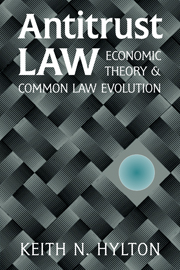Book contents
- Frontmatter
- Contents
- Preface
- 1 Economics
- 2 Law and Policy
- 3 Enforcement
- 4 Cartels
- 5 Development of Section 1 Doctrine
- 6 Rule of Reason and Per-Se Rule
- 7 Agreement
- 8 Facilitating Mechanisms
- 9 Boycotts
- 10 Monopolization
- 11 Power
- 12 Attempts
- 13 Vertical Restraints
- 14 Tying and Exclusive Dealing
- 15 Horizontal Mergers
- 16 Mergers, Vertical and Conglomerate
- 17 Antitrust and the State
- Index
9 - Boycotts
Published online by Cambridge University Press: 12 November 2009
- Frontmatter
- Contents
- Preface
- 1 Economics
- 2 Law and Policy
- 3 Enforcement
- 4 Cartels
- 5 Development of Section 1 Doctrine
- 6 Rule of Reason and Per-Se Rule
- 7 Agreement
- 8 Facilitating Mechanisms
- 9 Boycotts
- 10 Monopolization
- 11 Power
- 12 Attempts
- 13 Vertical Restraints
- 14 Tying and Exclusive Dealing
- 15 Horizontal Mergers
- 16 Mergers, Vertical and Conglomerate
- 17 Antitrust and the State
- Index
Summary
The question this chapter considers is when a concerted refusal to deal, or boycott, violates Section 1. There are really two questions involved. The first is the threshold question of whether an agreement exists. Without an agreement, there is no conspiracy and no violation of Section 1. If an agreement does exist, then the question turns to whether the agreement unreasonably restrains trade. Several issues examined in the cases below become relevant. Is the challenged practice an agreement to refuse to deal, or merely an agreement to share information on an actor or group of actors? Does rule of reason or per-se analysis apply? What does it mean to apply per se analysis? Would the per-se rule apply only after proof of an agreement to refuse to deal, or would it apply after evidence established that an agreement, of any sort (e.g., to share information), resulted in several members of a group refusing to deal with someone else?
Boycott doctrine can be divided into three developmental stages. The first is pre-Socony, in which the Court applied the rule of reason. The second is post-Socony, in which the Court shifted toward a per-se rule. The third period is post-BMI/Sylvania, in which the Court adopted a hybrid rule of reason/per-se test. I trace the development of boycott doctrine in each of these periods below.
PRE-SOCONY
The first Supreme Court case to deal with the questions set out above, Eastern States, involved a group of retail lumber dealers that boycotted wholesalers who sold directly to consumers.
Information
- Type
- Chapter
- Information
- Antitrust LawEconomic Theory and Common Law Evolution, pp. 166 - 185Publisher: Cambridge University PressPrint publication year: 2003
